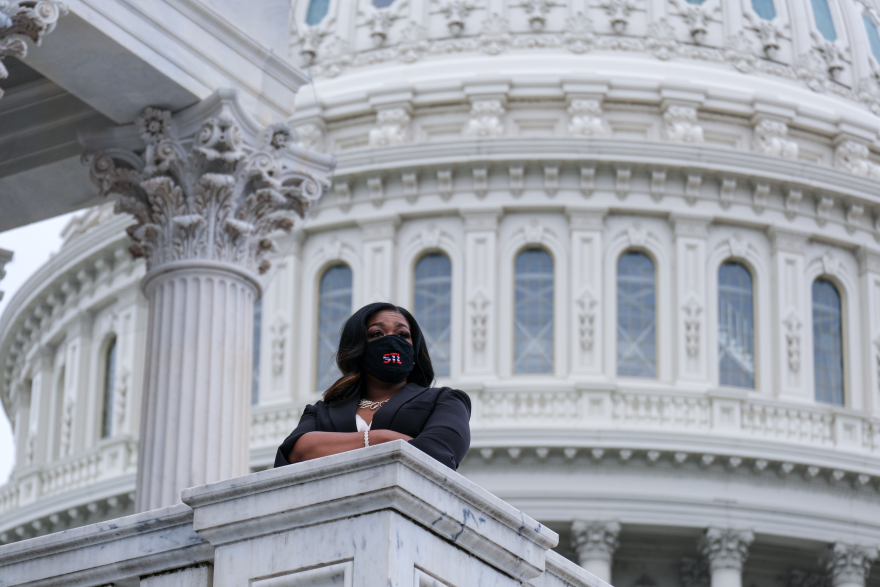U.S. Rep. Cori Bush has co-sponsored a bill to give the federal Department of Health and Human Services the power to implement federal eviction moratoriums during a public health crisis.
This legislative effort comes after the U.S. Supreme Court ruled in August that the Centers for Disease Control and Prevention exceeded its authority to enact nationwide eviction moratoriums. Its ban was set to expire on Oct. 3.
Bush announced the Keeping Renters Safe Act of 2021 on Tuesday with U.S. Sen. Elizabeth Warren, D-Mass., who co-authored the bill, during a press conference on the steps of the U.S. Capitol.
It’s imperative that Congress provide protections to people who are being evicted during the coronavirus pandemic, Bush said.
“The goal of the Keeping Renters Safe Act is to keep vulnerable tenants safe from further harm, especially while states and localities are working, working hard to distribute the nearly $40 billion left in the emergency rental assistance funds,” Bush said.
The legislation aims to allow renters to stay in their homes during public health crises by amending a section of the Public Health Service Act. The new legislation will give the HHS secretary and the CDC permanent authority to enact national residential eviction moratoriums.
The bill also will allow federal housing officials to implement a moratorium that does not require people to apply for eviction protections. The ban would halt all residential eviction filings, hearings and execution of judgments, and it will remain in effect at least 60 days after the end of the public health emergency.
Bush said the act would save lives and give local governments more time to process applications for federal rental aid.
Bush can empathize with families facing eviction. She said being evicted more than once in the St. Louis region caused her and her family trauma and fear.
“I will never forget the fear that rushed through my body when I saw the eviction notice posted on my own door,” Bush said. “The fear that comes with not knowing how I would be able to keep my children safe, keep a roof over our heads or keep a job. I experienced violence and trauma all three times that I was evicted.”
In August, Bush and other housing advocates and lawmakers slept on the steps of the Capitol building to protest the ending of the federal eviction moratorium. She called for Congress to extend the ban. A few days later, the Biden administration enacted another moratorium, but the Supreme Court invalidated it on Aug. 26.
Warren said that the pandemic is not over and that lawmakers must do everything to protect renters from evictions and help them recover.
“We did this because it is the right thing to do and it is the safe thing to do, but an extremist Supreme Court cut short eviction protections and put millions of people at risk for losing their homes,” Warren said. “Forcing tens of thousands of people out of their homes will only make this public health crisis worse.”
Other lawmakers who endorsed the bill say it will keep millions of people in their homes and help families lower their risk of eviction and contracting the coronavirus.
In the St. Louis region, housing advocates have complained that local officials are not processing applications for rental assistance quickly enough. Some believe that if St. Louis and St. Louis County officials do not disburse funds fast enough, renters will be evicted before their landlords receive back rent.
However, the St. Louis County Council voted earlier this month to reinstate the county’s eviction moratorium, which will go into effect this week. St. Louis does not have an active or forthcoming eviction moratorium.
St. Louis County received $26.6 million in federal rental assistance. As of Tuesday, the county has distributed about $14.7 million to renters in need. As of early September, St. Louis officials distributed about $2.2 million of its allotted $8 million in federal relief funds.
Congress must protect the millions of people at risk of losing their homes and their lives during the pandemic, Bush said.
“An eviction moratorium is the difference between life and death,” she said.
Follow Andrea: @drebjournalist





